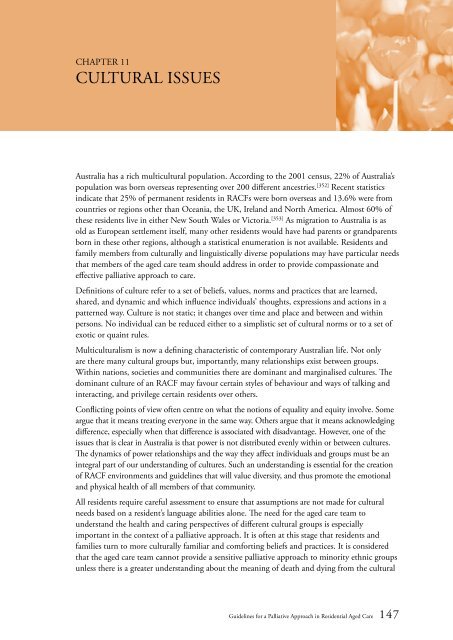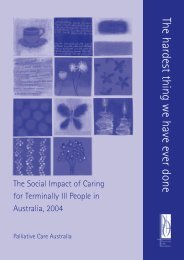Guidelines for a Palliative Approach in Residential Aged Care
Guidelines for a Palliative Approach in Residential Aged Care
Guidelines for a Palliative Approach in Residential Aged Care
Create successful ePaper yourself
Turn your PDF publications into a flip-book with our unique Google optimized e-Paper software.
CHAPTER 11<br />
CULTURAL ISSUES<br />
Australia has a rich multicultural population. Accord<strong>in</strong>g to the 2001 census, 22% of Australia’s<br />
population was born overseas represent<strong>in</strong>g over 200 different ancestries. [352] Recent statistics<br />
<strong>in</strong>dicate that 25% of permanent residents <strong>in</strong> RACFs were born overseas and 13.6% were from<br />
countries or regions other than Oceania, the UK, Ireland and North America. Almost 60% of<br />
these residents live <strong>in</strong> either New South Wales or Victoria. [353] As migration to Australia is as<br />
old as European settlement itself, many other residents would have had parents or grandparents<br />
born <strong>in</strong> these other regions, although a statistical enumeration is not available. Residents and<br />
family members from culturally and l<strong>in</strong>guistically diverse populations may have particular needs<br />
that members of the aged care team should address <strong>in</strong> order to provide compassionate and<br />
effective palliative approach to care.<br />
Def<strong>in</strong>itions of culture refer to a set of beliefs, values, norms and practices that are learned,<br />
shared, and dynamic and which <strong>in</strong>fluence <strong>in</strong>dividuals’ thoughts, expressions and actions <strong>in</strong> a<br />
patterned way. Culture is not static; it changes over time and place and between and with<strong>in</strong><br />
persons. No <strong>in</strong>dividual can be reduced either to a simplistic set of cultural norms or to a set of<br />
exotic or qua<strong>in</strong>t rules.<br />
Multiculturalism is now a def<strong>in</strong><strong>in</strong>g characteristic of contemporary Australian life. Not only<br />
are there many cultural groups but, importantly, many relationships exist between groups.<br />
With<strong>in</strong> nations, societies and communities there are dom<strong>in</strong>ant and marg<strong>in</strong>alised cultures. The<br />
dom<strong>in</strong>ant culture of an RACF may favour certa<strong>in</strong> styles of behaviour and ways of talk<strong>in</strong>g and<br />
<strong>in</strong>teract<strong>in</strong>g, and privilege certa<strong>in</strong> residents over others.<br />
Conflict<strong>in</strong>g po<strong>in</strong>ts of view often centre on what the notions of equality and equity <strong>in</strong>volve. Some<br />
argue that it means treat<strong>in</strong>g everyone <strong>in</strong> the same way. Others argue that it means acknowledg<strong>in</strong>g<br />
difference, especially when that difference is associated with disadvantage. However, one of the<br />
issues that is clear <strong>in</strong> Australia is that power is not distributed evenly with<strong>in</strong> or between cultures.<br />
The dynamics of power relationships and the way they affect <strong>in</strong>dividuals and groups must be an<br />
<strong>in</strong>tegral part of our understand<strong>in</strong>g of cultures. Such an understand<strong>in</strong>g is essential <strong>for</strong> the creation<br />
of RACF environments and guidel<strong>in</strong>es that will value diversity, and thus promote the emotional<br />
and physical health of all members of that community.<br />
All residents require careful assessment to ensure that assumptions are not made <strong>for</strong> cultural<br />
needs based on a resident’s language abilities alone. The need <strong>for</strong> the aged care team to<br />
understand the health and car<strong>in</strong>g perspectives of different cultural groups is especially<br />
important <strong>in</strong> the context of a palliative approach. It is often at this stage that residents and<br />
families turn to more culturally familiar and com<strong>for</strong>t<strong>in</strong>g beliefs and practices. It is considered<br />
that the aged care team cannot provide a sensitive palliative approach to m<strong>in</strong>ority ethnic groups<br />
unless there is a greater understand<strong>in</strong>g about the mean<strong>in</strong>g of death and dy<strong>in</strong>g from the cultural<br />
<strong>Guidel<strong>in</strong>es</strong> <strong>for</strong> a <strong>Palliative</strong> <strong>Approach</strong> <strong>in</strong> <strong>Residential</strong> <strong>Aged</strong> <strong>Care</strong> 147
















